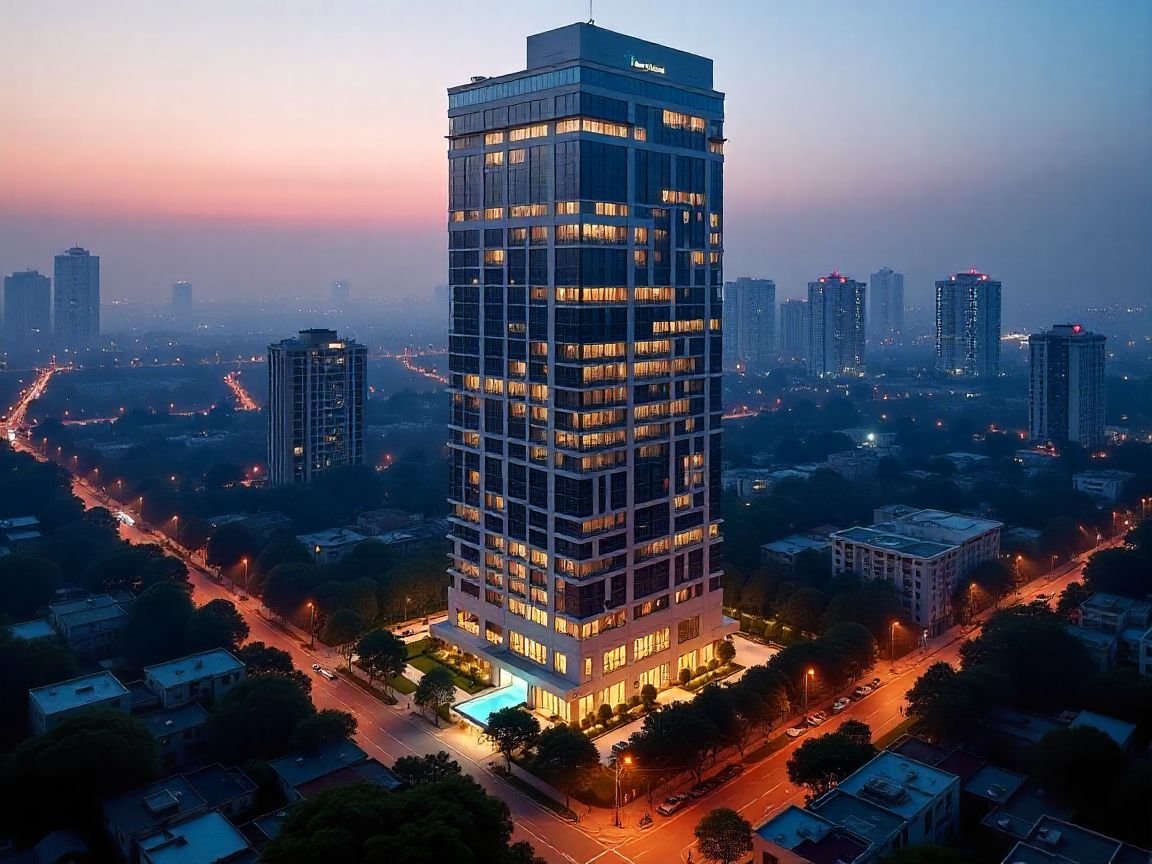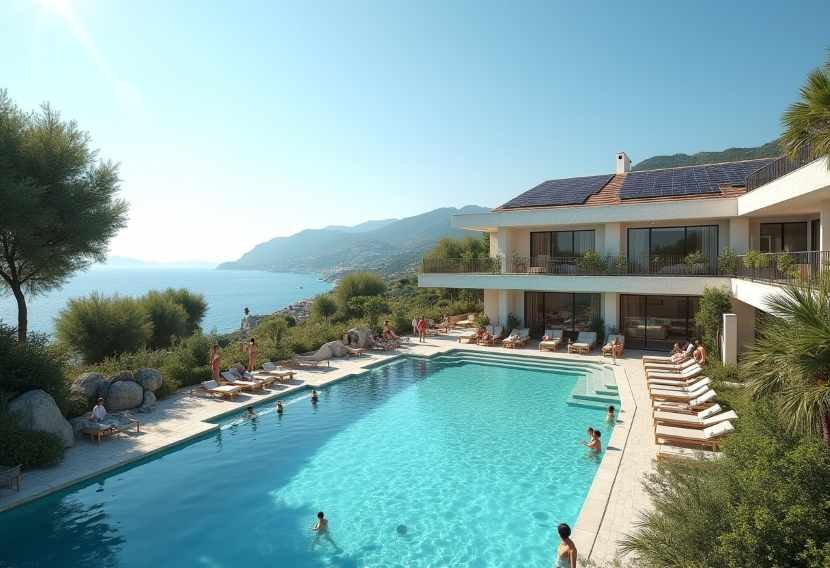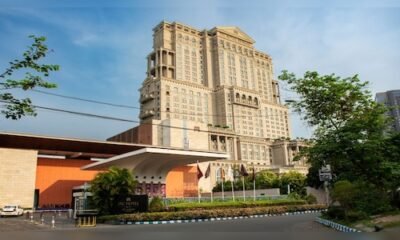Hotels & Accommodations
Optimal time to open, grow hospitality brands in India: ITC Hotels MD

“India is going through a phase, and it’s not just large corporates and big-ticket investors who would be able to afford hotels anymore. A chain like ours straddles across segments to cater to all kinds of customer needs, as they changed post the Covid-19 pandemic,” Chadha told ET in an interview. “You could build a 50-room or a 30-room hotel depending on the brand and your propensity to earn in a city. If somebody came to us three years ago and said I want you to manage our 30-room hotel, we would have said no. But today, we see a need,” he said.
Cigarette-to-soap conglomerate ITC’s hotel business was demerged effective January 1, spawning a separate listed hospitality entity. Shares of ITC Hotels started trading on the stock exchanges on January 29.
Chadha said ITC Hotels is exploring opportunities to take its famed Bukhara dining brand overseas. It is also in talks to enter the branded residences segment.
“With our quality of service, we can add value to the branded residences space, and we are in discussions. It’s not just about the luxury segments,” he said.
“For instance, we also have our boutique brand Storii as a concept, and we are exploring if we can build Storii villas around a Storii property. In the Welcomhotel space, we are exploring opportunities for residences,” he added.ITC Hotels reported consolidated revenue from operations of ‘816 crore for the quarter ended June, up 16% year-on-year. Profit surged 54% to ‘134 crore.Chadha highlighted the company’s improving operational performance. “This applies to occupancies, average room rates, and commanding a much better revenue per available room. For domestic owned hotels, our occupancies have improved from 62% in quarter one of financial year 2024 to 73% in quarter one of financial year 2026,” he said. “In terms of our revenue per available room performance across markets, as per CoStar data for year to date May 2025, for our domestic owned hotels in the luxury, upper upscale and upscale segments, ITC Hotels is commanding a premium of 34% over the industry.”
New ITC hotels will be opened in locations such as Kochi, Jaipur, Gwalior, Bhopal, Bodh Gaya, Udaipur, Rishikesh, and Wayanad this year. Chadha said the newly-opened ITC Ratnadipa in Sri Lanka has received a positive response, and that the company is now getting offers for more hotel opportunities in the island nation. “We have a small Fortune hotel in Nepal, and have signed another Welcomhotel about seven months ago. We are also exploring opportunities in the Middle East,” he said.
He said ITC Hotels has a very strong zero-debt balance sheet, and is open to both inorganic growth opportunities and acquisitions.
Hotels & Accommodations
Hilton Dhaka, A Landmark Hotel Opening in Bangladesh, What You Need to Know

Monday, August 4, 2025
Bangladesh’s hospitality sector is gearing up for a milestone event with the impending hotel opening of Hilton Dhaka, a luxury hotel with modern facilities, situated in the bustling Gulshan area of the city. Hilton Dhaka is anticipated to open in late 2025, and with its 34 floors, including five below ground, will reach 108 meters. This makes it one of the tallest skyscrapers in Dhaka.
A New Era of Luxury in Dhaka
This new Hilton property will mark the iconic brand’s debut in Bangladesh, signifying a major step forward in the country’s tourism and hospitality landscape. With 250 meticulously designed rooms, including suites and villas, Hilton Dhaka promises to deliver a blend of contemporary luxury and modern amenities to meet the demands of both business and leisure travelers.
The hotel’s location in Gulshan-2, an upscale and business-centric area of Dhaka, ensures its status as a top choice for global travelers. Known for housing numerous embassies and corporate offices, the district is an ideal location for international guests, offering proximity to key business hubs while providing easy access to cultural landmarks and recreational sites.
World-Class Amenities
Hilton Dhaka is set to offer an unrivaled selection of first-class amenities to meet the needs of modern travelers. The hotel will offer diverse dining options which will include an all-day dining restaurant, specialty and deli eateries, and a lobby lounge. Guests will also enjoy a stylish bar which is a perfect venue to unwind after a busy day of meetings or sightseeing.
Wellness will be the foremost focus of the guest experience with a full service spa, a fitness center and a rooftop pool with panoramic views of the Dhaka skyline. The hotel will also offer extensive business event facilities including a grand ballroom and numerous meeting rooms specially designed for modern business events with cutting-edge technology to host conferences, seminars and social gatherings.
Sustainable Architecture and Design
Hilton Dhaka has been designed with an emphasis on sustainability and modern architecture. The building’s striking glass façade will not only add to Dhaka’s skyline but will also reflect Hilton’s commitment to green building standards. The hotel will incorporate energy-efficient technologies and sustainable practices, ensuring a minimal environmental footprint while offering exceptional luxury and comfort.
Moreover, the design of the hotel takes into account the growing demand for business-centric properties that blend both corporate and leisure experiences. The integration of a multi-level parking facility further supports the accessibility of the hotel for guests traveling by car.
Key Highlights
- 250 Rooms: Spacious, luxury accommodations designed to meet global standards.
- 34 Floors: One of the tallest hotel buildings in Bangladesh, offering expansive views of Dhaka.
- World-Class Dining: Multiple dining options, including international cuisine and local specialties.
- Wellness Facilities: Full-service spa, fitness center, and rooftop pool.
- Event Spaces: Ballroom and versatile meeting rooms equipped for corporate events.
- Sustainable Design: Green architecture with energy-efficient technologies and practices.
Anticipated Impact on Dhaka’s Hospitality Industry
The opening of Hilton Dhaka will mark a new milestone in the city’s reputation as a business and leisure hub. Expected to be one of the best hotels in Dhaka, it will cater to the needs of not only international tourists but also business executives, offering a premium stay experience.
The opening of international hotel brands like Hilton Dhaka greatly enhances Dhaka’s emerging position as a global business and hospitality hub. With the expansion of Hilton hotels comes the promise of not just a luxurious hotel stay but the transforming image of Bangladesh as a competitive tourist hot spot.
The iconic mark of the Hilton Dhaka hotel will be its blend of convenience, luxury and sustainable practices. Opening it will allow visitors to enjoy sophisticated modern luxury while experiencing the best of Dhaka’s hospitality. As the date approaches, anticipation will be mounting as Dhaka’s skyline will be enhanced in a remarkable way and so will the hospitality landscape of the country.
Hotels & Accommodations
Greece’s Hotels Go Green: How Energy Efficiency Is Shaping The Future Of Sustainable Tourism

Sunday, August 3, 2025
Facing the ongoing pressures of global climate change, Greece is pioneering a strategic reorientation of its tourism sector, prioritizing sustainability over the previous model of mass visitation. Whereas the nation’s tourism was historically characterized by high volumes of visitors converging on coastal resorts, the current trajectory emphasizes energy-efficient practices, reduced carbon footprints, and the preservation of natural and cultural heritage. This pivot is informed by both pressing ecological imperatives and the recognition that a resilient economy—especially the tourism-dependent hospitality industry—must adapt to climate realities for long-term vitality.
The Green Shift: Energy Efficiency as a Priority
In recent years, Greece has been dealing with the growing impacts of the climate crisis. The rising temperatures and unpredictable weather patterns have made it more difficult for businesses in the tourism sector to operate as they once did. At the same time, Greece’s hotel industry is one of the largest energy consumers, particularly during the high tourist season. Consequently, there has been a push to invest in energy-efficient technologies and sustainability practices in the hospitality sector.
Dr. Vasilis Ntouros, a physicist with the National and Kapodistrian University of Athens’ Building Environmental Research Group, has been at the forefront of this transformation. According to Dr. Ntouros, targeted energy upgrades could reduce a hotel’s energy consumption by as much as 72%. While the average hotel currently consumes 430 kilowatt-hours of energy per square meter annually, these upgrades could bring consumption down to below 120 kilowatt-hours, significantly reducing operational costs and environmental impact. This shift not only helps the environment but also provides long-term financial benefits for the tourism industry.
Sustainable Hotel Upgrades: What Needs to Change?
To achieve these savings, the Greek hospitality sector has started to implement several energy-saving measures. Among the most effective solutions are building insulation upgrades, modern heating and cooling systems, and advanced energy management systems. Many hotels are investing in solar panels and heat pumps, which not only lower energy costs but also help Greece meet its carbon reduction goals.
In addition to energy systems, the hotels are making structural improvements to manage water usage more effectively. Dr. Ntouros emphasized that cooling and heating systems are the largest contributors to a building’s energy consumption, accounting for nearly 50% of a building’s energy use annually. In particular, air conditioning systems are crucial during the hot summer months, making them a primary focus of the upgrades.
As the climate crisis intensifies, the industry must look beyond basic upgrades. Efficient lighting solutions, such as LED bulbs and motion sensors, can help reduce energy use in public areas and guest rooms. However, the real game-changer will be the comprehensive approach that integrates energy-saving technologies with improved building design and management systems.
Financial Impact and Investment in Sustainable Tourism
The Greek tourism industry has already begun to respond to this call for sustainability. The Hellenic Federation of Hoteliers reports that in 2024, the Greek hotel sector invested over €1 billion, with 20% of this total earmarked for energy efficiency projects like solar panels and heat pumps. This substantial investment shows that the Greek hospitality sector is embracing sustainability not just as a necessity but as a competitive edge in the global tourism market.
The need for energy-efficient solutions is particularly acute on the Greek islands, where tourism heavily impacts local resources. As an increasing number of tourists flock to destinations like Santorini, Mykonos, and Crete, the pressure on local resources—such as water and electricity—has escalated. Sustainable upgrades are vital in ensuring that tourism continues to be a viable and environmentally responsible industry on these islands. This shift towards green tourism is also part of a broader global trend where travelers are becoming more conscientious about their environmental impact.
Environmental Performance Metrics and Future Roadmap
In light of these efforts, Greece’s Ministry of Tourism, the Hellenic Chamber of Hotels, and the Technical Chamber of Greece have come together to create a new hotel classification system. This innovative classification system will rate hotels based on their environmental performance, providing tourists with a clear indicator of which properties are taking serious steps to reduce their carbon footprint and overall environmental impact.
The new system aims to make it easier for tourists to choose eco-friendly accommodations, and it will serve as a valuable tool for hoteliers looking to upgrade their properties to meet these sustainability standards. With many travelers increasingly prioritizing green practices when selecting destinations, Greece’s new system is expected to give the country a competitive edge in the ever-growing market for sustainable tourism.
Educational Efforts: Greece Leads by Example
In addition to upgrading hotels, Greece is positioning itself as an educational hub for sustainability in tourism. The National and Kapodistrian University of Athens is playing a key role in demonstrating how existing buildings can be retrofitted for sustainability. Under the European project ProGETonE, the university is conducting a radical renovation of its student dormitory to reduce energy consumption to almost zero.
This project not only serves as a model for other institutions and hospitality businesses but also educates students, architects, and engineers on the importance of green building practices. By showing how simple yet effective upgrades can dramatically reduce energy consumption, Greece is helping to create a new generation of environmentally conscious tourism professionals.
Challenges: The Road Ahead
Despite significant progress, challenges remain for the Greek tourism industry. As of now, only 32% of Greek hotels monitor their water usage, and just 25% have implemented comprehensive recycling programs. This shows that while energy-saving measures are being prioritized, other environmental practices such as waste management and water conservation are still in the early stages.
Moreover, the path to full sustainability will be long and require continuous investment. Hotels, particularly smaller ones in rural areas and on the islands, may struggle to implement energy-efficient upgrades due to financial constraints. To address this, Greece’s government and industry leaders will need to offer incentives and support to help smaller properties adopt green technologies.
Conclusion: A Sustainable Future for Greek Tourism
Greece’s transition to sustainability in tourism is an essential strategic response to climate change and a decisive investment in enduring economic prosperity. Through widespread adoption of energy-efficient technologies, the country safeguards its delicate ecosystems while establishing a model of responsible management for global tourism hubs. Although the path ahead includes major challenges, the commitment to environmental stewardship is already influencing policy design, traveler expectations, and the resilience of local economies. This proactive orientation not only preserves the integrity of a globally treasured destination but also demonstrates that ecological and economic objectives can be mutually reinforcing in the coming era of climate-conscious travel.
Hotels & Accommodations
‘Hire Americans’: Miami hotel slammed for outsourcing front desk to India | Trending

A video that shows the front desk of a Florida hotel being manned by a virtual receptionist has sparked outrage in the United States. The video has raised concerns about American jobs being outsourced to other countries at a time when the anti-immigrant sentiment is at an all-time high.
Video of virtual front desk staffer sparks outrage
The video was first shared by Pete Langs (@languageguy1) on TikTok and Instagram. It shows Langs checking into his room with the help of a man who sits not at the front desk but appears on a screen during the check-in process.
“Do you need one room key or two room keys?” the virtual front desk employee asks Langs, who replies, “Two, just in case I lose one.” The receptionist, speaking over a video call through the screen, issues further check-in instructions and generates the registration form.
“Miami virtual check in at hotels!” Langs wrote while sharing the video on TikTok and Instagram.
The video was reposted on X, where it sparked outcry against Indians for ‘stealing’ American jobs. Although there is nothing in the video to indicate that the front desk employee is Indian or not living in the US, viewers surmised from his appearance and accent that he belongs to the subcontinent.
“Hire Americans”
“Miami hotel has outsourced their front desk to India. Guests are checked in virtually on video call with an Indian representative,” read the caption on X. “More American jobs outsourced overseas. At some point this should just become illegal. If you make money in America, you should hire Americans”.
The comments section of the video was therefore quickly flooded with outrage as Americans blamed Indians for taking jobs. Many people also slammed the hotel for outsourcing the front desk role to someone sitting outside the US.
“So American jobs are being taken by Indian people overseas AND AI at the same time. Two slaps in the face,” a user said.
“The irony is people will hate the Indians who are just doing a job while completely ignoring the American bosses and shareholders who actually made the decision to outsource these jobs in the first place,” another pointed out.
“It’s up to people to actually walk out. The problem is these hotels are cheaper than everyone else because they’re hiring outside the country,” a third added.
-

 Brand Stories2 weeks ago
Brand Stories2 weeks agoBloom Hotels: A Modern Vision of Hospitality Redefining Travel
-

 Brand Stories1 week ago
Brand Stories1 week agoCheQin.ai sets a new standard for hotel booking with its AI capabilities: empowering travellers to bargain, choose the best, and book with clarity.
-

 Destinations & Things To Do2 weeks ago
Destinations & Things To Do2 weeks agoUntouched Destinations: Stunning Hidden Gems You Must Visit
-

 Destinations & Things To Do1 week ago
Destinations & Things To Do1 week agoThis Hidden Beach in India Glows at Night-But Only in One Secret Season
-

 AI in Travel2 weeks ago
AI in Travel2 weeks agoAI Travel Revolution: Must-Have Guide to the Best Experience
-

 Brand Stories4 weeks ago
Brand Stories4 weeks agoVoice AI Startup ElevenLabs Plans to Add Hubs Around the World
-

 Brand Stories3 weeks ago
Brand Stories3 weeks agoHow Elon Musk’s rogue Grok chatbot became a cautionary AI tale
-

 Asia Travel Pulse4 weeks ago
Asia Travel Pulse4 weeks agoLooking For Adventure In Asia? Here Are 7 Epic Destinations You Need To Experience At Least Once – Zee News
-

 AI in Travel4 weeks ago
AI in Travel4 weeks ago‘Will AI take my job?’ A trip to a Beijing fortune-telling bar to see what lies ahead | China
-

 Brand Stories4 weeks ago
Brand Stories4 weeks agoChatGPT — the last of the great romantics













You must be logged in to post a comment Login